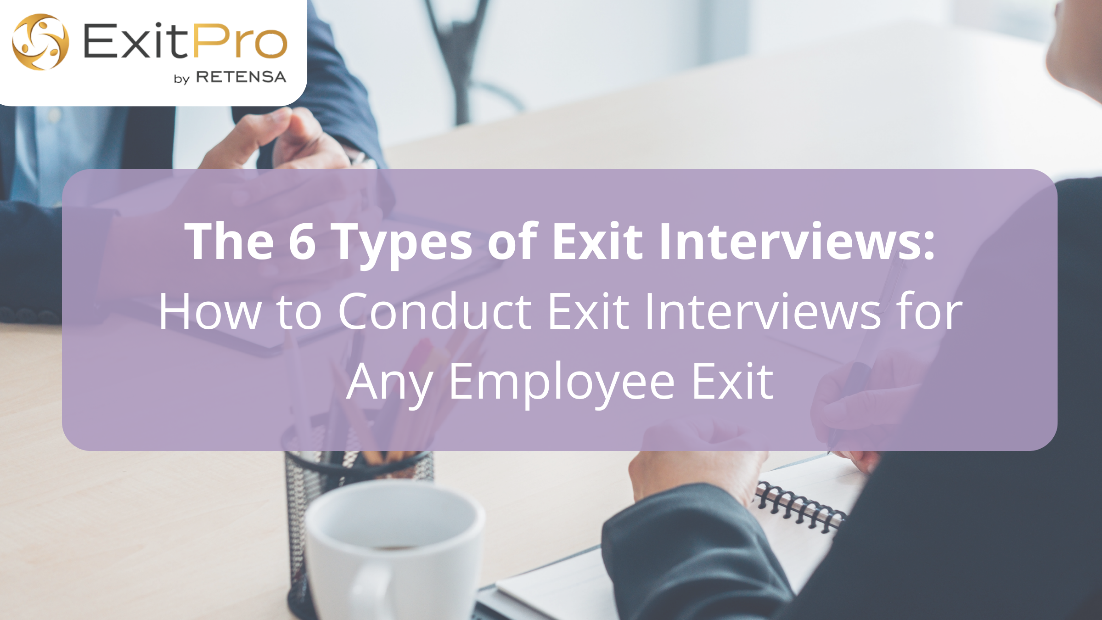How do you conduct exit interviews in your organization? Are you asking the right exit interview questions? The key to an effective exit interview is to ask questions whose answers will help you actionize the data. Only by connecting how employees feel working for you with the actions they take while working for you, can you accurately and consistently predict employee turnover.
In this post we’ll discuss how to improve the exit interview process by conducting the interview the best way to get results. Ask the best 8 exit interview questions, and mine the answers to make a difference. Let’s get into it
Conducting a Great Exit Interview
Conducting a great exit interview requires a consistent approach. Your goal is to collect information that provides actionable insights and helps to make improvements in the employee experience. To achieve this, it’s important to build a replicable strategy around your exit interview process.
With the proper strategy in place across the organization, you will set the best time to conduct the exit interview, how to conduct it, and the right employee exit interview survey questions to ask to get the most meaningful feedback. You will also know how to improve the exit interview process over time, so you get the most valuable information from your separating employees.
Related Article: Top 5 Mistakes Companies Make Conducting Exit Interviews

Important Exit Interview Questions to Include in Your Exit Interviews
1. What is Your Primary Reason for Leaving?
This is a slightly different exit interview question to include in your exit survey to improve your company’s exit interview templates. The key is “Primary”. And respondents get ONE answer.
NOTE: This only works with a longer questionnaire that collects the alternate experiences around the “Primary” reason.
So, if you’re aiming for a shorty under 5 total questions, don’t use this one. The answers you get will quickly help you track the most influential themes and develop solutions to solve the underlying problems.
2. Did Your Supervisor/Manager Recognize Your Contributions?
The manager-employee relationship is the single most influential factor in employment. Asking your departing employees how they were managed is a good measure of how well your employee recognition strategy works. These questions are best asked using a scale of responses from Strongly Agree, Agree, Disagree, or Strongly Disagree.
To get deeper into managerial quality, you can also ask if a supervisor/manager provided useful feedback, treated employees fairly, or encouraged their career development.
3. During Your Tenure with our Company, Did You Ever Observe Any Unethical or Inappropriate Behavior? If yes, please describe the nature of the issue.
This is a good question for spotting “red flags,” abuses, or behaviors that remain hidden to many in HR and management. A “yes” answer to this question warrants immediate further investigation. The answers you get will reveal the issues your current employees are uncomfortable discussing.
For anyone concerned of asking questions like this and having a duty to act, be assured these issues were already said to someone. Their peers or another manager or maybe local HR was told. Knowing with clarity and context what the concerns are presents a far better position to act with expediency and success.
4. Were You Given the Tools, Resources and Technology to Succeed in Your Role?
This is a great exit interview question to ask to gather insights into the steps you can take to ensure that the employee who fills the position will stay with your company.
The answer to this question will help you know more about how the working conditions and technology in your organization affect your employees’ performance and productivity. You will also gather information on whether you are providing adequate training for your employees.
5. What Does Your New Company Offer that [ORGANIZATION NAME]Did Not?
Asking about what the employee will get in their new job helps to pinpoint why they are leaving. There are “push” factors and “pull” factors at work here. Many competitor’s recruiters will find an opening, and they will call back for another employee and leverage it. You can establish a defensive position here. Are they getting higher compensation? Maybe your salaries and benefits package is lacking. Are they looking forward to opportunities for advancement to managerial positions? Maybe your company should work on its promotion strategies.
6. How Would You Rate the Employee Morale in Your Department?
Asking about how to improve staff morale can be a game changer for your company. You see, employees are more likely to discuss their morale issues within themselves than with a manager. The answers you get from this exit interview question will shed light on the general state of the entire team, not just the individual answering the question.
7. Would You Recommend [ORGANIZATION NAME] as a Good Place to Work?
This exit interview question is valuable because the responses can be used to develop a generalized Employee Net Promoter Score (or “eNPS”) for your organization’s alumni. Simply take the percentage of employees who are likely to “recommend the company” and subtract the percentage of employees who are unlikely to recommend the company to calculate your eNPS. This is a useful overarching metric to track results of employee initiatives and ask for clarification on areas of improvement. It also provides a temperature check of what people are saying about your organization in the marketplace, so you can address real or perceived shortcomings.
eNPS Formula =
(% Likely to Recommend) – (% Unlikely to Recommend)
Ignore the “Not sure” in the middle for eNPS calculation
8. What Are Your Recommendations for Improvement at [ORGANIZATION NAME]?
This question opens up room for your employee to speak about what they wish was different in your workplace. By comparing the answers to different interviews, you will notice a pattern that can point out the real issues you need to address.

Applying Action from Exit Interviews
The point of conducting an exit interview is to identify areas where your organization can improve, so you can boost employee engagement and improve retention.
Therefore, once you have conducted multiple exit interviews, you must carefully examine the data collected. Good exit interview reports produced from exit interview vendors like ExitPro , accelerate what you learn from exit interviews. Some exit interview companies devise ways to improve your culture so your remaining employees have the best experience possible.
When using data from exit interviews, it is best to look at trends across all exit interviews rather than relying on one interview to make decisions. Trends that appear across a number of exit interviews (or enough from a given department, location, or manager) show that the issue affects more than one employee. Address those as soon as possible to impact more employees at once.
Employee Retention Idea #08:
Start Employee Retention Strategies Here
Exit interviews are an irreplaceable tool for HR managers and decision-makers looking to reduce staff attrition and predict employee turnover. By asking the right exit interview questions and incorporating feedback into recruitment and management processes, HR leaders can create a more positive and productive work environment for all employees.
If you want a cost-effective and time-efficient way to gain the most insight from your exit interviews, outsourcing the task to third-party exit interview experts can reap great rewards. At Retensa, they are dedicated to helping HR managers improve the exit interview process, contact them to get expert advice and options to reduce turnover. By using Retensa’s best practices in choosing employee exit interview survey questions, you’ll gain the most effective actionable insights for your company.




